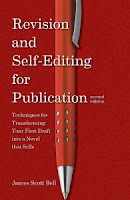I’ll bet you could ask ten writers their revision process and
you’d get ten different styles or processes for revisions. Some love it . . . and some absolutely hate
it. Why?
Many writers prefer writing . . . writing . . . and
writing. I think that’s the category I
prefer. Others embrace the process of revision and strive on the act of
strengthening, polishing, and ultimately making their novel the best it can be.
Whether you love or hate it, revision is an essential part of
writing, and one that every writer must accept.
There are ways to minimize the revising process. In Revision and Self-Editing for Publication author James Scott Bell gives you
four ways to revise as you write. If
this is the style of revision you prefer, his book is a worth buying and
reading. The premise of this method is
as follows:
1. Revise Your Previous Pages - Look at what you wrote the day before
(or during your last writing stint), and do a quick edit. This practice puts
you back into the flow of your story and gets you ready to write the new
material.
In Revision and Self-Editing for Publication author James Scott Bell states he
likes to print out a hard copy of pages and mark them up. Of course, you can do
all this on the computer screen. He just finds that the act of reading physical
pages more closely mimics what a reader will be doing, and he will catch more
things this way.
In this stage he shares he is mostly editing for style - the way
the sentences flow. He wants to make sure what he wanted to convey has actually
happened on the page. If a major plot or character problem emerges, or he gets
an idea for something to add, he just makes a note of it and moves on to reach
his day’s writing quota.
Mr. Bell suggests you should write as fast as you comfortably
can on your first draft.
Have you heard of the 20,000-Word Step Back - Whether you’re a ‘no outline person
or an ‘outline Person,’ this 20,000-word step back can be a tremendous tool.
After 20,000 words you stop, take a day off, then read what you
have. By this time your story it mapped out in your mind and you’ve done enough
of the novel to know what it’s about. Now take some time to make sure you like
the characters and the direction you have them going.
If thing seem off, now is the time to make some changes. Make sure your characters are starting to
feel well-rounded, they are recognizable through actions, oddities, imperfections,
and tags.
Take note of the tone you’ve given your novel. Is this the
direction you want it to take? If not,
again, now is the time to make some changes.
Now get excited and get that novel finished.
Bonus - Don’t lose thoughts and ideas you have
along the way… make sure you keep a small notebook handy to you can jot this
information down in one place. I had to
learn this lesson the hard way. I jotted
on a piece of paper a Gypsy law I discovered and could hardly wait to use it .
. . the I couldn’t find it! Never did
find it on the paper or in my research.
Keep your notes in a 4x5” notebook and you’ll never have this happen to
you.



Nice post, Rita. I'm a number oner all the way, but I believe this is why it takes me so long to write/rewrite a story.
ReplyDeleteSome authors churn out a few 10k stories a month, and gets them published where it takes me near six months. I don't know if this is a good or bad thing.
Thanks, Lorrie... you know what . . . I think we all have to 'write' to our own creative process. Trying to write like someone else will just frustrate us! :) My humble opinion... keep doin' it your way! :) Rita
Delete